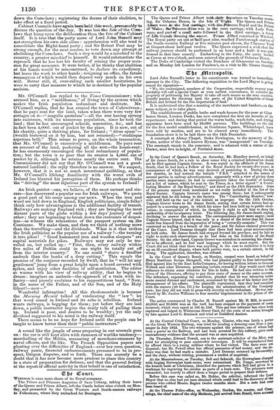An Irish patriot—one, we believe, of the most earnest and
sin- cere—has discovered a popular use for Irish railways. We quote a good part of his essay among our news. When the iron and wood are laid down in England, English politicians, simple folks! think only how advantageous is the additional facility of transit. Railways are making England rich ; they are bringing the most distant parts of the globe within a few days' journey of each other ; they are beginning to break down the restraints of despot- ism—as witness the relaxations of the passport system on _the Continent. We make them, and then we think of nothing more than the travelling—and the dividends. What is it that strikes the Irish politician as the popular use of a railway ?—the turning it into pikes! " Good hammered iron and wooden sleepers" are capital materials for pikes. Railways may not only be tra- velled on, but pulled up : "First, then, every railway within five miles of Dublin could in one night be totally cut off from the interior country." No one could "desire a deadlier ambush than the banks of a deep cutting." This equals the promise of the conjuror recorded by Swift, that he "will let any gentlemen" jump from a great height upon a board covered with spikes, and enjoy other facilities of self-mutilation. The editor so warms with his view of railway utility, that he begins to dream : imagines an ambush—the approach of a train with in- fantry—and piously exclaims to his supposititious band, "Now, in the name of the Father, and of the Son, and of the Holy Ghost !now—" Wonderful infatuation! All this rhodomontade is because the Morning Herald talked of vindicating the "law": let that word sound in Ireland and its echo is rebellion. Ireland wants railways, is begging for them; yet before they are laid down' a public instructor begins the ready talk of pulling them up. Ireland is poor, and desires to be wealthy ; yet the only dividend suggested to his mind is the railway itself.
There seems to be no hope for Ireland until the people can be taught to know better than their "public instructors."


























 Previous page
Previous page